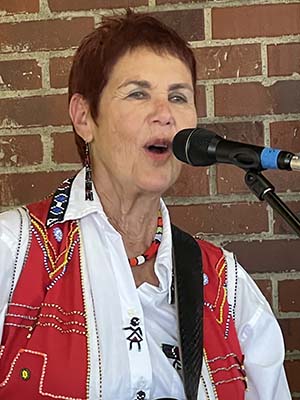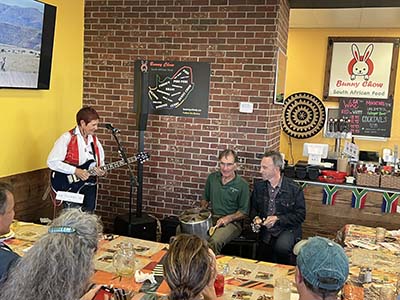By Donald H. Harrison


SAN DIEGO – Troubador Sharon Katz, who won fame in South Africa as the leader of the Peace Train that brought together a 500-member choir representing that country’s many ethnicities, provided a free concert Monday evening, June 26, at the Bunny Chow restaurant, whose owners were instrumental in bringing her to the San Diego/ Tijuana region where again she has been promoting peace through music.
As her manager, Marilyn Cohen, told the story, a documentary about Katz’s work was being shown at the Toronto Film Festival. During a festival break, Katz was approached in a restroom by Carol Wolfson, mother of Bunny Chow’s co-owner, Gary Wolfson.
“You have to bring that film to San Diego,” Carol Wolfson, who also hails from South Africa, told her. La Jolla and other parts of San Diego have attracted numerous South African immigrants over the years, many of them, like Katz, Jewish.
After the singer and peace worker accepted the invitation, she became involved with the San Diego PeaceMakers Fund and with Promotora Bellas Artes in Tijuana leading to Katz working with Mexican school children from poorer neighborhoods. After teaching them songs, including some from South Africa, a 150-member choir toured with Katz in Tecate, Mexico City, Puebla and Oaxaca in a Mexican version of the Peace Train.
Cohen told diners at Bunny Chow, a Miramar Road restaurant which serves traditional South African cuisine, that when Katz was a teenager, living under the apartheid system of South Africa which demanded strict separation of the races, she used to sneak away from her home in Port Elizabeth (now named Nelson Mandela Bay). To learn and play African music, she would climb into the back seat of her Black friends’ car and cover herself with blankets so she wouldn’t be spotted by White South African police. Then she would be driven to one of the nearby Black townships which were off-limits to Whites.
After apartheid was ended and Mandela became South Africa’s President, Katz formed the Peace Train, a 500-voice choir, that toured around South Africa “to show what a normal country could look like,” according to Cohen. As in Mexico, Katz forms Peace Trains “around the world in areas where people need to get to know each other and become friends with one another to bring the levels of violence down and the levels of trust up.”

Bunny Chow is a small restaurant, but by reconfiguring tables, including some that were set in a semicircle around the corner where Katz had set up a microphone and a set of speakers, the restaurant was able to accommodate 46 enthusiastic listeners, whom Katz urged to eat and talk while she played.
She sang several African songs, some in Xhosa, others in Zulu, as well as her original English composition, “It’s a Crazy Life.” Among the Xhosa songs were two made popular by Miriam Makeba, who had stayed away from South Africa for 25 years in self-exile during the apartheid era. One of the Makeba songs Katz sang was “The Click Song,” which Katz explained was about a traditional African healer or “witch doctor.” It is called by English people “The Click Song” because they cannot make the clicking sound that occurs in many Xhosa words.
In Zulu, Katz sang Mbube (Lion) by Solomon Linda, which when translated and sung by the Tokens in 1961 as “The Lion Sleeps Tonight” became a smash hit in America.
Katz invited Gary Wolfson’s uncle David Kramer and San Diego musician Howard Shachat to join her in the little performance area. Kramer brought out from the kitchen a pot and some utensils with which he and Shachat provided rhythms accompaniment for the next couple of songs.

Davida Huchel, who had been moving to the music throughout the night, invited waiter Tana Colibaly from the Ivory Coast to dance with her, and soon the tiny restaurant was transformed into a concert and dance venue, with patrons enthusiastically waving their arms and moving to the rhythms. Those few diners who remained seated kept time by clapping or drumming on the table.
Clearly, the crowd that included some South Africans and many Americans was exhilarated by the music and pleased by such South African dinner selections as bunny chow (curry served in a hollowed out piece of bread), for which the restaurant was named; bobotie (a ground beef or ground lamb pot pie), boerewors (farmers sausage),and sasoties (skewers of marinated lamb, apricot, red pepper, and other vegetables).
Following Katz’s performance, there were such desserts to savor as melktert (a milk tart dusted with cinnamon and nutmeg) and malva pudding (an apricot sweet bread covered with custard.)
“This is fantastic,” Gary Wolfson enthused about the dinner concert. “We’ll do more of these.” Katz will return to Bunny Chow on Monday, Aug. 14, with her band.
*
Donald H. Harrison is editor emeritus of San Diego Jewish World. He may be contacted via donald.harrison@sdjewishworld.com
So beautifully written, Don.
Allows us to track Sharon and Marilyn’s journey into our world and see why we enjoy a better life trip because of them!
So sorry I missed this event and seeing you both.
Your article and pics made me feel part of it. Have you been to South Africa yet?
Carol
A fabulous concert! Thank you for this wonderful article, Don Harrison. You haven’t lost your literary touch!
Great Article!